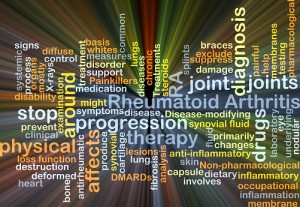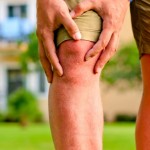

 Recently, there was a scientific breakthrough on the diagnosis of rheumatoid arthritis (RA); a team of researches uncovered a protein that helps regulate the severity of tissue damage caused by RA. This discovery is going to provide a quicker and earlier diagnosis for patients who would experience the most severe effects of rheumatoid arthritis. Early diagnosis will lead to aggressive treatments and as a result, reduced damage to the joints.
Recently, there was a scientific breakthrough on the diagnosis of rheumatoid arthritis (RA); a team of researches uncovered a protein that helps regulate the severity of tissue damage caused by RA. This discovery is going to provide a quicker and earlier diagnosis for patients who would experience the most severe effects of rheumatoid arthritis. Early diagnosis will lead to aggressive treatments and as a result, reduced damage to the joints.
Currently, one of the major challenges of RA is effectively diagnosing it early enough to treat it. A team of Irish scientists from UCD and the University of Sheffield analyzed biopsy samples and DNA data from over 1,000 RA patients.
Research leader, from UCD, Professor Gerry Wilson, said, “Our findings provide a genetic marker that could be used to identify those RA patients who require more aggressive treatments or personalized medicine.” The marker is a protein (C5orf30) that can help normalize the level of tissue damage (and even prevent tissue damage) resulting from RA.
Researchers are hoping to further study the effects of C5orf30 on RA patients.
 Rheumatoid arthritis is an autoimmune disease. It causes pain, joint damage, stiffness and inflammation in the hands, feet, knees and hips. It commonly affects more than one joint at a time. It can also result in fever, fatigue and nausea. It effects women more often (and more severely) than men and is most common for those between the ages of 40 and 70. Unfortunately, it can also be found in children and young adults.
Rheumatoid arthritis is an autoimmune disease. It causes pain, joint damage, stiffness and inflammation in the hands, feet, knees and hips. It commonly affects more than one joint at a time. It can also result in fever, fatigue and nausea. It effects women more often (and more severely) than men and is most common for those between the ages of 40 and 70. Unfortunately, it can also be found in children and young adults.
Although there are mild and moderate cases of RA, most patients suffer from a severe form that lasts several years or even a lifetime. RA affects about one percent of the population and is the most common form of inflammatory arthritis. Thirty percent of rheumatoid arthritis patients will be incapable of working after only 10 years of suffering.
Rheumatoid arthritis is often debilitating and there is no cure; however, if it is caught early, aggressive treatment and self-regulation have been known to help reduce the overall pain. That is why the recent study has proved to be such a breakthrough for those suffering from RA.
Along with the breakthrough discovery of protein markers, there are many symptoms of rheumatoid arthritis. There are also risk factors that increase your chance of developing RA.
 At the start of RA, smaller joints are most often affected, especially your knuckles. Next, symptoms can spread to other areas of the body, such as ankles, wrists, elbows, hips, knees and shoulders. If you experience the pain in your left knee, you will most likely experience it in your right knee as well. Some symptoms of rheumatoid arthritis are frequent and severe while others tend to come and go in waves. As time passes, RA causes deformation and shifting of joints which is quite painful for the individual suffering from it.
At the start of RA, smaller joints are most often affected, especially your knuckles. Next, symptoms can spread to other areas of the body, such as ankles, wrists, elbows, hips, knees and shoulders. If you experience the pain in your left knee, you will most likely experience it in your right knee as well. Some symptoms of rheumatoid arthritis are frequent and severe while others tend to come and go in waves. As time passes, RA causes deformation and shifting of joints which is quite painful for the individual suffering from it.
If any of the following symptoms persist, you should make an appointment to see your doctor:
If you are concerned about developing this severe form of arthritis, there are a few factors which can contribute to the risk of rheumatoid arthritis, including:
Unfortunately, once you start showing symptoms of rheumatoid arthritis you will also be experiencing the accompanying pain. It is useful to be aware of the other effects of RA on the body.
 According to the Arthritis Foundation, over 1.5 million people in the U.S. suffer from RA. Although rheumatoid arthritis mainly effects the joints, it can also cause symptoms through the entire body. The symptoms of RA effect the following:
According to the Arthritis Foundation, over 1.5 million people in the U.S. suffer from RA. Although rheumatoid arthritis mainly effects the joints, it can also cause symptoms through the entire body. The symptoms of RA effect the following:
If you are suffering from RA and want to help reduce the symptoms there are several measures you can take to prevent joint damage and severe pain.
 Although there is no cure for rheumatoid arthritis, treatment for has improved. Following a few simple steps can help most people experience less joint damage than in the past. Here are five tips to help improve your chances of decreased pain and damage:
Although there is no cure for rheumatoid arthritis, treatment for has improved. Following a few simple steps can help most people experience less joint damage than in the past. Here are five tips to help improve your chances of decreased pain and damage:
Unfortunately, there is no current cure for rheumatoid arthritis; however, the new research can help provide earlier detection which will lead to faster treatment and reduced severity in symptoms. Be aware of your risk factors and the symptoms of RA and be sure to contact your healthcare professional if any pain is persistent or overwhelming.
Should you exercise if you have arthritis?
If we have an underlying health condition, like arthritis, exercise may be difficult and almost scary. No matter the benefits, if we think exercising will increase our pain, it’s likely we’ll avoid it. Here’s what you need to know about staying active with arthritis. Continue reading…
Mood affects pain in rheumatoid arthritis patients
The study uncovered that positive mood was associated with less pain and fewer arthritis-related restrictions, and negative mood increased pain and arthritis-related restrictions. Continue reading…
Copyright © www.orthopaedics.win Bone Health All Rights Reserved